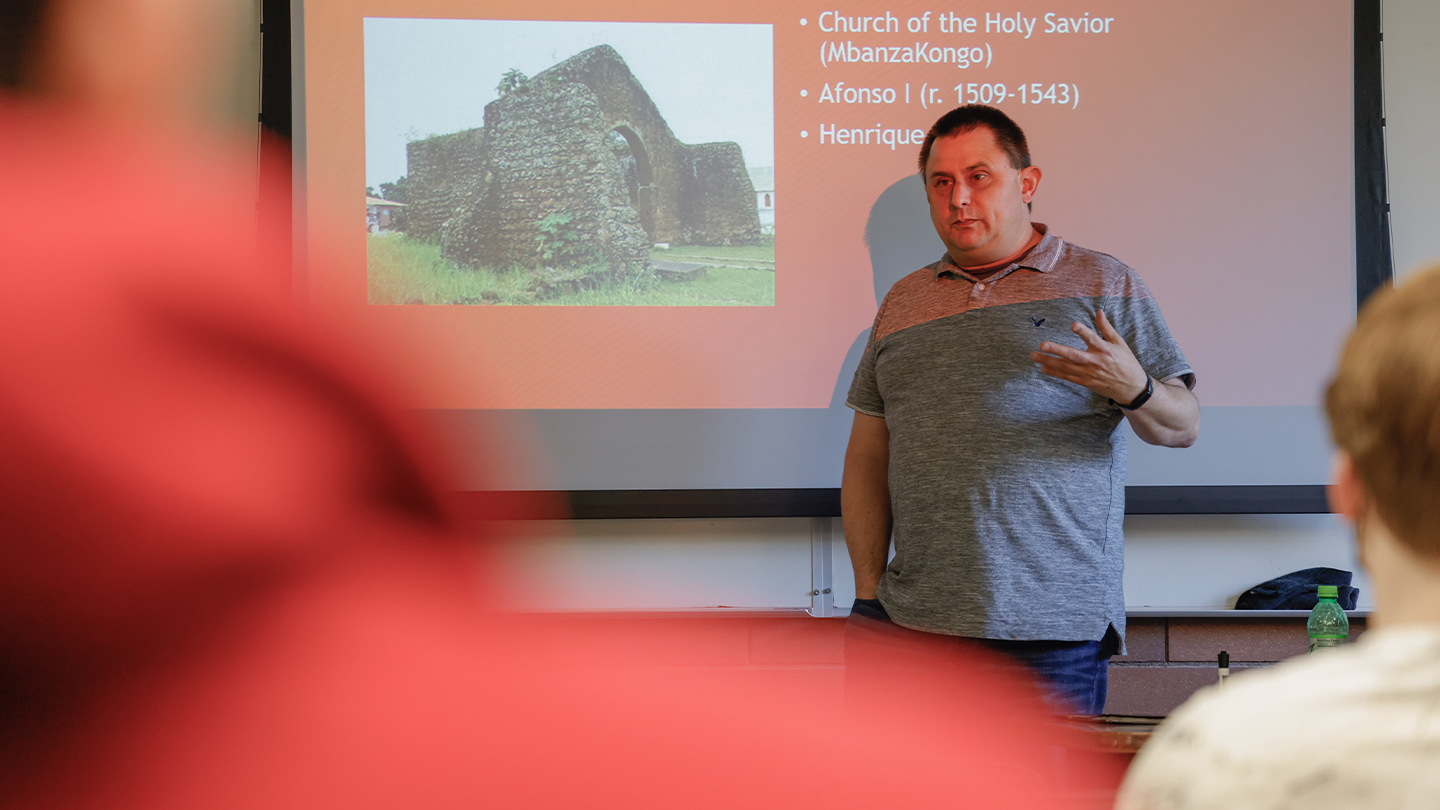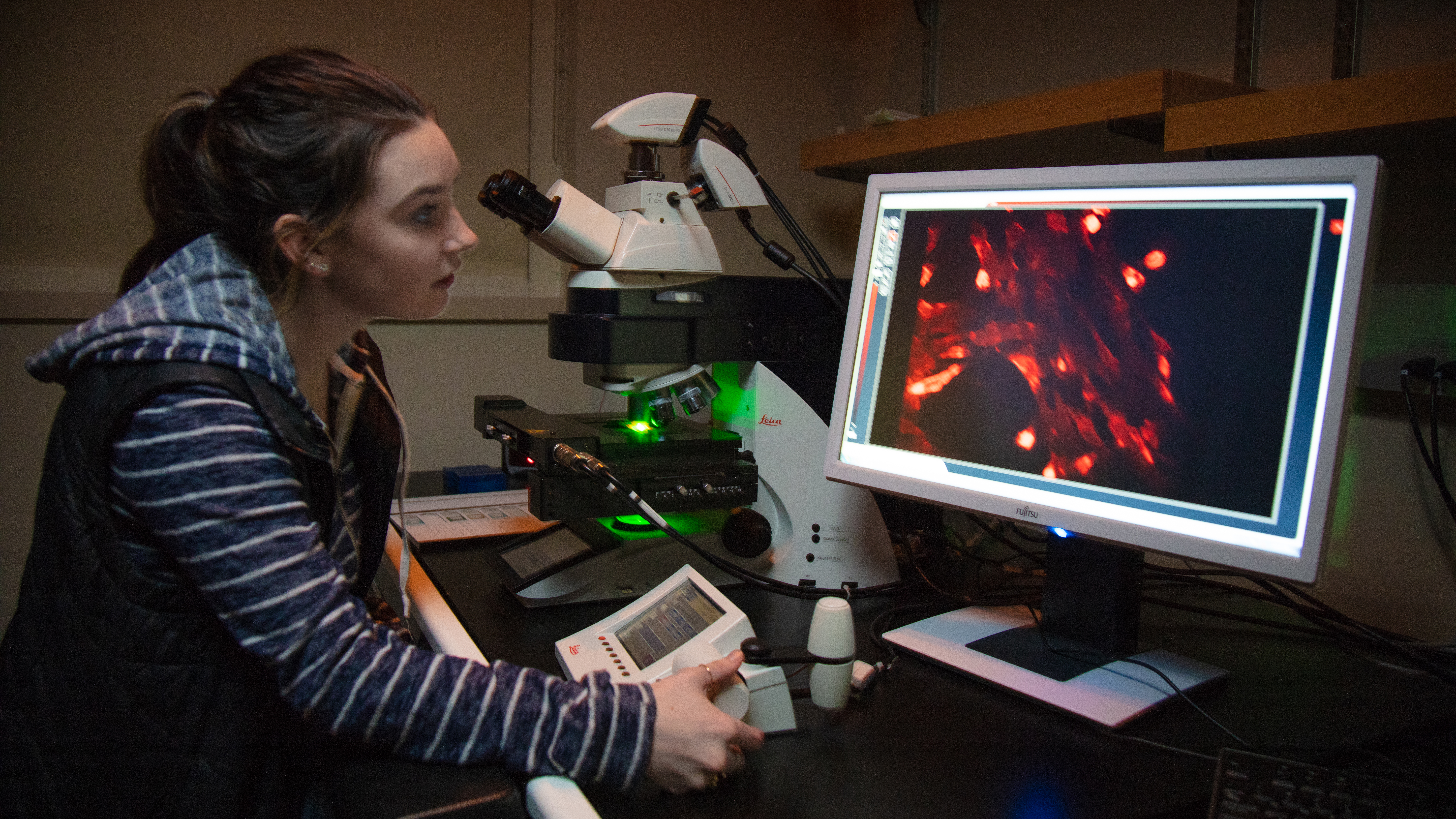
History
Master of Arts in History
About the History, MA
A master's degree in History offers you the unique opportunity to discover the intricacies of the past, explore diverse perspectives, and acquire a deeper understanding of the world we live in. As you embark on this intellectual journey, you will uncover pivotal moments in history that have shaped the present and will continue to influence the future. Graduates will leave equipped with the tools necessary to contribute to a better understanding of our collective past.
Visit Department WebsiteWhy Study History at CWU?
Our faculty in the History Department are dedicated to fostering an environment that encourages curiosity, critical thinking, and the cultivation of rich historical knowledge.
Through a variety of classes, you will pick a specialization and work closely with a mentor, engaging with primary and secondary sources, developing analytical skills, and learning to communicate effectively both in written and oral forms. The capstone on your work results is a thesis or field examination to demonstrate your expertise in the field.
"Because the department is relatively small, I was able to work one-on-one with faculty members to improve my scholarly work. The small department size also allowed me to develop friendships with my classmates, who provided advice and support throughout the program." Talea Anderson graduated in 2013 and is working as a Scholarly Communication Librarian at WSU Libraries.
Where is this program offered?
How much does this program cost?
Explore information on Cost, Aid, and Value to make an informed decision about investing in your education at CWU.
Does CWU offer assistantships?
Find opportunities to fund your degree through the School of Graduate Studies and Research.
Where can I find more information?
Please visit the CWU Academic Catalog for current information about admission requirements, course descriptions, learner outcomes, and credit information.
Visit the School of Graduate Studies and Research for additional program eligibility information.
Careers and Opportunities
The skills and knowledge gained through advanced historical study can be applied across many sectors, including education, research, cultural preservation, and writing.
- Historian: You could continue your work as a historian, conducting in-depth research, analyzing historical documents, and interpreting historical events. Historians can work in various settings, including academic institutions, museums, government agencies, and historical preservation organizations.
- Museum Curator or Archivist: With specialized skills and experience, you can pursue a career as a museum curator or archivist. In this role, you would be responsible for managing and preserving historical artifacts, creating exhibits, conducting research, and organizing collections in museums, libraries, or archives.
- Educator: A master's degree in history can lead to a career in education. You can become a high school history teacher or pursue opportunities in higher education as a college professor.
- Policy Analyst or Researcher: Your degree will equip you with excellent research and analytical skills, making you well-suited for careers in policy analysis, research, or think tanks. You can apply your historical expertise to policy issues, contribute to public discourse, and inform decision-making processes.
Additional Program Information
-
Admission Requirements
Admitted students are required to demonstrate an ability to research and interpret historical evidence and to write cogently and lucidly. In addition to general regulations for graduate admissions, the applicant must:
- Attain an undergraduate major in history. Students whose undergraduate major was in a subject other than history, but who nevertheless wish to complete a history graduate degree, must have completed at least 20 undergraduate, upper division quarter credits with at GPA of 3.0 or better prior to full admission to the graduate program. Students with fewer than 20 history quarter credits may be offered probationary admission.
- Attain a 3.0 cumulative GPA for undergraduate work and a 3.25 GPA or better in the history major. Applicants with a lower GPA may petition the History Department Graduate Committee for special consideration.
- GRE examination requirement temporarily waived.
- Submit a 7-10 page writing sample.
- Choose an advisor and a general area of study.
- Choose either the thesis track or the examination track.
Prospective students must be approved in writing by the graduate committee (with the Graduate Director as a voting member), the Department Chair, and the prospective advisor before being granted admission to the graduate program.
-
Program Options
Thesis:
A thesis is a lengthy monographic work (usually 50 to 150 pages long) that addresses a historically significant topic in an original way.
This option is appropriate if you wish to pursue a Ph.D., either immediately after receiving the M.A. or at some point in the future. Students who cannot meet the deadlines listed on page four will not be able to pursue the thesis option. Further, students must attain a 3.5 GPA or better in the graduate program in order to pursue the thesis option without special approval from the graduate committee and the advisor. Students with GPAs below 3.5 will ordinarily do the written examination option.
Your advisor will help you choose two additional faculty members to serve on your thesis committee. The committee’s job is to help formulate and critique the thesis. After the thesis is completed, you will defend your findings before their thesis committee. At the discretion of the advisor, students opting for the thesis option may be required to meet the Department’s foreign language requirement.
Written examination:
The exam consists of three questions in a major field. Generally speaking, committees prefer written exam answers that show your familiarity with historical context, historical periodization, and historiography, and that marshal evidence to make original arguments. The entire written portion of the exam must be completed in eight hours.
Choose this option if you do not wish to write a thesis. It is especially useful for secondary school teachers who want to attain the M.A. in a timely manner. Students who choose the exam option must select an advisor and adhere to the timeline given on page 4 of the Graduate Handbook.
Your advisor will help you choose two additional faculty members to serve on your exam committee. The committee’s job is to write questions for the exam and review your answers. In advance of the exam, the committee will work with you to delineate a field and suggest an appropriate reading list. Your advisor may work with you on sample questions and responses in order to better prepare you for the exam. After the exam is completed, you must defend your answers before the committee. Students opting for the exam option do not have to meet the Department’s foreign language requirement.
Project:
On rare occasions, if your background or experience allows, and when faculty availability and expertise exists, you may complete a project in lieu of the traditional thesis. In such special cases, proposals for an alternative to the exam or thesis options must be approved by your advisor and committee. Students opting for the project option do not have to meet the Department’s foreign language requirement.
-
Fields of Study
- 19th Century U.S.
- Modern East Asia
- 20th Century U.S.
- Modern France
- African Childhood and Education
- Modern Germany
- African Gender
- Modern Ireland
- African Health and Healing
- Modern Mexico
- Colonial Africa
- Mongol Empire
- Colonial Mexico
- Native American History
- Colonial/Revolutionary North America
- Pacific Northwest History
- Comparative Borderlands
- Pre-Imperial Africa
- Comparative Colonialism
- Pre-Imperial Russia
- Comparative Gender
- Race and Ethnicity
- Comparative Nationalism
- Russian Empire
- Comparative Revolutions
- The Soviet Union
- Environmental History
- U.S. Cultural History
- Holocaust
- U.S. Environmental History
- Imperial Russia
- U.S. Foreign Relations
- Islamic Intellectual History
- U.S. Imperialism
- Islamic Sufism
- U.S. Political History
- Latin American Cultural History
- U.S. Social History
- Latin American Religious History
- U.S. West
- Latin American State Foundation
- Urban Africa
- Military History
- Urban History
- Modern Britain and the Empire
- WWII
Highlights
Our Graduates Get Published
Katie Omans published an article in 2022 in the Irish Historical Studies journal titled “The Belfast Boycott: consumerism and gender in revolutionary Ireland 1920-1922.” Irish Historical Studies is the flagship journal in Irish History and Studies. Omans graduated in 2021 and is now teaching history at CWU.
Related Programs

Graduate Degrees
Art, MFA
At CWU, we offer a terminal MFA for students interested in studying visual art beyond undergraduate work.

Graduate Degrees
Biology, MS
You will have the opportunity to conduct original research and work alongside expert faculty.